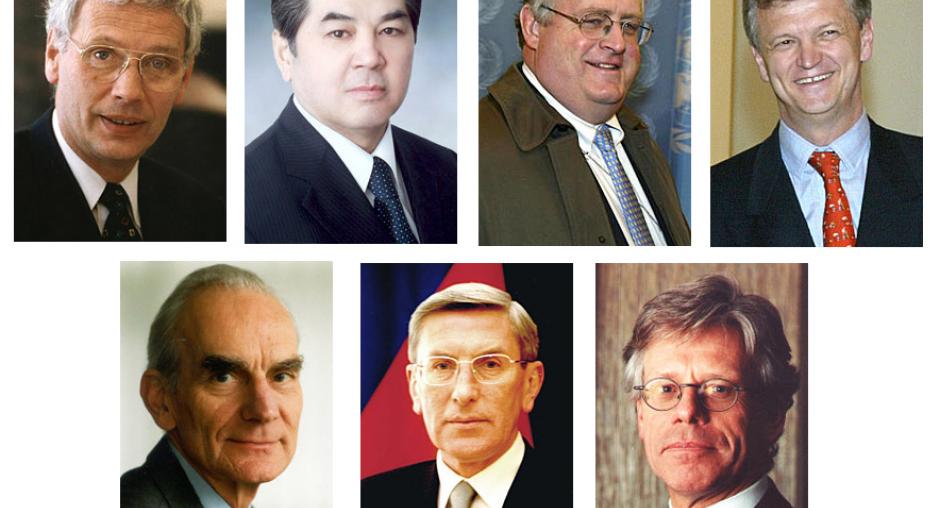Newsroom
OSCE Chairman urges Eminent Persons group to be bold in drawing up vision for Organization's future
LJUBLJANA 17 February 2005

(OSCE)Seven prominent personalities who will advise on ways of strengthening the effectiveness of the OSCE. (top L-R) Hans van den Broek, Kuanysh Sultanov, Richard S. Williamson, Miomir Zuzul. (bottom L-R) Wilhelm Hoeynck , Nikolai Afanasjevski, Knut Vollebaek. (OSCE) Photo details
LJUBLJANA, 17 February 2005 - The OSCE Chairman-in-Office, Slovenian Foreign Minister Dimitrij Rupel, urged the new OSCE Panel of Eminent Persons on Thursday to be bold in drawing up a new vision for the future of the 55-nation security organization.
Chairing the first meeting of the seven-member Panel, which was appointed to review the effectiveness of the OSCE and make recommendations on its future, he said the Organization was at a critical stage, with a lively discussion underway about its role in the European security architecture and its general relevance.
"I don't want to overdramatize this - the OSCE has been in a constant state of flux since 1975 and has periodically been adapting and re-tooling itself to deal with changed threats and challenges to security," the Chairman-in-Office said at the meeting at Brdo Castle in Brdo pri Kranju, near Ljubljana.
"But long-time OSCE-watchers tell me that the situation now is significantly different. Serious questions are being raised at a high level about the OSCE and there is a strong sense that something profound has to change. That is why this Panel has been formed."
The Panel, which includes several former foreign ministers, a former OSCE Chairman-in-Office and a former OSCE Secretary General, was briefed on the Organization's current activities by Secretary General Jan Kubis.
Minister Rupel said the mandate of the Panel was to give new impetus to political dialogue and provide a strategic vision for the Organization in the twenty-first century. It is due to deliver its recommendations by the end of June.
"My expectation, which I believe is shared by all participating States, is that you will provide us with a vision for the future and some radical, yet politically realistic, food for thought on where the OSCE should be going in the years ahead," he said.
The members of the Panel are:
Chairing the first meeting of the seven-member Panel, which was appointed to review the effectiveness of the OSCE and make recommendations on its future, he said the Organization was at a critical stage, with a lively discussion underway about its role in the European security architecture and its general relevance.
"I don't want to overdramatize this - the OSCE has been in a constant state of flux since 1975 and has periodically been adapting and re-tooling itself to deal with changed threats and challenges to security," the Chairman-in-Office said at the meeting at Brdo Castle in Brdo pri Kranju, near Ljubljana.
"But long-time OSCE-watchers tell me that the situation now is significantly different. Serious questions are being raised at a high level about the OSCE and there is a strong sense that something profound has to change. That is why this Panel has been formed."
The Panel, which includes several former foreign ministers, a former OSCE Chairman-in-Office and a former OSCE Secretary General, was briefed on the Organization's current activities by Secretary General Jan Kubis.
Minister Rupel said the mandate of the Panel was to give new impetus to political dialogue and provide a strategic vision for the Organization in the twenty-first century. It is due to deliver its recommendations by the end of June.
"My expectation, which I believe is shared by all participating States, is that you will provide us with a vision for the future and some radical, yet politically realistic, food for thought on where the OSCE should be going in the years ahead," he said.
The members of the Panel are:
- Nikolai Afanasjevski (Russian Federation)
- Hans van den Broek (Netherlands)
- Wilhelm Hoeynck (Federal Republic of Germany)
- Kuanysh Sultanov (Republic of Kazakhstan)
- Knut Vollebaek (Norway)
- Richard S. Williamson (United States of America)
- Miomir Zuzul (Republic of Croatia)
